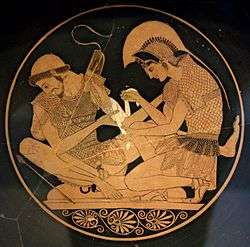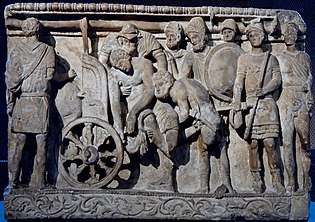Patroclus
In Greek mythology, as recorded in Homer's Iliad,[1] Patroclus /pəˈtroʊkləs/[lower-alpha 1] (Ancient Greek: Πάτροκλος Pátroklos, "glory of the father") was a close wartime companion of Achilles. He was the son of Menoetius, the son of Actor, King of Opus.

Family
According to Hyginus, Patroclus was the child of Menoetius by either Sthenele, Periopis, Polymele,[6] Philomela,[7] or Damocrateia.[8] Homer also references Menoetius as the individual who gave Patroclus to Peleus.[10] Menoetius was the son of Actor,[11] king of Opus in Locris by Aegina, daughter of Asopus.
Mythology
Early days
During his childhood, Patroclus had killed another child in anger over a game. Menoetius gave Patroclus to Peleus, Achilles' father, who named Patroclus Achilles' "squire" as Patroclus and Achilles grew up together.[12] Patroclus acted as a male role model for Achilles, as he was both older than Achilles and wise regarding counsel.[lower-alpha 2][13]
Trojan War
According to the Iliad, when the tide of the Trojan War had turned against the Greeks and the Trojans were threatening their ships, Patroclus convinced Achilles to let him lead the Myrmidons into combat. Achilles consented, giving Patroclus the armor Achilles had received from his father, in order for Patroclus to impersonate Achilles. Achilles then told Patroclus to return after beating the Trojans back from their ships.[14](pp353 b. 16 l. 64–87) Patroclus defied Achilles' order and pursued the Trojans back to the gates of Troy.[15] Patroclus killed many Trojans and Trojan allies, including a son of Zeus, Sarpedon.[14](pp363 b. 16 l. 460) While fighting, Patroclus' wits were removed by Apollo, after which Patroclus was hit with the spear of Euphorbos. Hector then killed Patroclus by stabbing him in the stomach with a spear.[14](pp373 b. 16 l. 804–822)
Achilles retrieved his body, which had been stripped of armor by Hector and protected on the battlefield by Menelaus and Ajax.[16] Achilles did not allow the burial of Patroclus' body until the ghost of Patroclus appeared and demanded his burial in order to pass into Hades.[14](pp474 b.23 l. 69–71) Patroclus was then cremated on a funeral pyre, which was covered in the hair of his sorrowful companions. As the cutting of hair was a sign of grief while also acting as a sign of the separation of the living and the dead, this points to how well-liked Patroclus had been.[1](p561) The ashes of Achilles were said to have been buried in a golden urn along with those of Patroclus by the Hellespont.[17]

Relationship with Achilles
Although there is no explicit sexual relationship between Achilles and Patroclus in the Homeric tradition, later Greek authors wrote about what they saw as implied in the text regarding their relationship. Aeschylus and Phaedrus, for example, state there was a clear relationship between them, and they both refer to Achilles as the eromenos of the relationship.[18] Morales and Mariscal state "there is a polemical tradition concerning the nature of the relationship between the two heroes".[18] According to Ledbetter (1993),[19] there is a train of thought that Patroclus could have been a representation of the compassionate side of Achilles, who was known for his rage, mentioned in the first line of Homer's Iliad. Ledbetter connects the way that Achilles and his mother Thetis communicate to the communication between Achilles and Patroclus. Ledbetter does so by comparing how Thetis comforts the weeping Achilles in Book 1 of the Iliad to how Achilles comforts Patroclus as he weeps in Book 16. Achilles uses a simile containing a young girl tearfully looking at her mother to complete the comparison. Ledbetter believes this puts Patroclus into a subordinate role to that of Achilles.[19] However, as Patroclus is explicitly stated to be the elder of the two characters,[20] this is not evidence of their ages or social relation to each other.
James Hooker describes the literary reasons for Patroclus' character within the Iliad. He states that another character could have filled the role of confidant for Achilles, and that it was only through Patroclus that we have a worthy reason for Achilles' wrath. Hooker claims that without the death of Patroclus, an event that weighed heavily upon him, Achilles' following act of compliance to fight would have disrupted the balance of the Iliad.[21] Hooker describes the necessity of Patroclus sharing a deep affection with Achilles within the Iliad. According to his theory, this affection allows for the even deeper tragedy that occurs. Hooker argues that the greater the love, the greater the loss. Hooker continues to negate Ledbetter's theory that Patroclus is in some way a surrogate for Achilles; rather, Hooker views Patroclus' character as a counterpart to that of Achilles. Hooker reminds us that it is Patroclus who pushes the Trojans back, which Hooker claims makes Patroclus a hero, as well as foreshadowing what Achilles is to do.[21]

Achilles and Patroclus grew up together after Menoitios gave Patroclus to Achilles' father, Peleus. During this time, Peleus made Patroclus one of Achilles' "henchmen".[22] While Homer's Iliad never explicitly stated that Achilles and Patroclus were lovers, this concept was propounded by some later authors.[23][24][lower-alpha 3] Aeschines asserts that there was no need to explicitly state the relationship as a romantic one,[24] for such "is manifest to such of his hearers as are educated men."[25] Later Greek writings such as Plato's Symposium, the relationship between Patroclus and Achilles is discussed as a model of romantic love.[26] However, Xenophon, in his Symposium, had Socrates argue that it was inaccurate to label their relationship as romantic. Nevertheless, their relationship is said to have inspired Alexander the Great in his own close relationship with his life-long companion Hephaestion.[23][27]
Achilles was younger than Patroclus.[lower-alpha 2][lower-alpha 4] This reinforces Dowden's explanation of the relationship between an eromenos, a youth in transition, and an erastes, an older male who had recently made the same transition.[30](p 112) Dowden also notes the common occurrence of such relationships as a form of initiation.[30](p 114)
Footnotes
- There are several variant pronunciations of 'Patroclus' in English.[2] Because the penultimate syllable is light in Latin prose, pă′.trŏ.clŭs, the antepenult would be expected to be stressed in English, for /ˈpæ.trə.kləs/ (analogous to 'Sophocles').[3] However, this pronunciation is seldom encountered: Pope had made the 'o' long, and thus stressed, for metrical convenience in his translation of Homer (following a convention of Greek and Latin verse), and that pronunciation – of Latin pa.trō′.clus – has stuck: /pəˈtroʊ.kləs/.[4] Because, in prose, a Greco-Latin short o / omicron would only be stressed in a closed syllable, the penult of this name has sometimes been reanalyzed as being closed, *pă.trŏc′.lŭs, which changes the English o to a short vowel: /pəˈtrɒk.ləs/.[5]
- Nestor, quoting Patroclus' father Menoetius, reminds Patroclus of his father's advice: "My child, in birth is Achilles nobler than thou, but thou art the elder though in might he is the better far. Yet do thou speak to him well a word of wisdom and give him counsel, and direct him; and he will obey thee to his profit."[28]
- As Martin (2012),[23] argues, "The ancient sources do not report, however, what modern scholars have asserted: that Alexander and his very close friend Hephaestion were lovers. Achilles and his equally close friend Patroclus provided the legendary model for this friendship, but Homer in the Iliad never suggested that they had sex with each other. (That came from later authors.) If Alexander and Hephaestion did have a sexual relationship, it would have been transgressive by majority Greek standards ..."[23](pp 99 ff)
- Plato in his Symposium[29] has one of his characters say that Achilles was "much the younger, by Homer's account".
References
- Martin, Richard (2011). The Iliad of Homer. Chicago, IL: The University of Chicago Press.
- Carey (1816) Practical English Prosody and Versification, p. 125 fn
- Bechtel (1908) Pronunciation
- "Patroclus". Dictionary.com Unabridged. Random House.
- "Patroclus". Lexico UK Dictionary. Oxford University Press.
- Pseudo-Apollodorus, Bibliotheca 3. 13. 8
- Hyginus, Fabulae, 97
- Scholia on Pindar, Olympian Ode 9, 107
- Homer (1924). The Iliad with an English Translation. Translated by Murray, A.T. Ph.D. Cambridge, MA; London, UK: Harvard University Press; William Heinemann, Ltd. "Online version". Perseus Digital Library.
- Homer. "online text". Iliad. Perseus Digital Library. 23.85.[9]
- Homer. "online text". Iliad. Perseus Digital Library. 11.785.,[9] and "online". 16.14.
- Homer. "online text". Iliad. Perseus Digital Library. 23.83–92.
- Finlay, Robert (1980). Patroklos, Achilleus, and Peleus: Fathers and Sons in the Iliad. The Classical World. pp. 267–273.
- Lattimore, Richmond (2011). The Iliad of Homer. Chicago: The University of Chicago Press.
- Smith, William (1849). Dictionary of Greek and Roman biography and mythology. Boston: Little. p. 140.
- Bulfinch, Thomas (1985). The Golden Age. London: Bracken Books. p. 272.
- Chisholm, Hugh (1911). "Achilles". Encyclopædia Britannica (11th ed.).
- Morales, Manuel Sanz; Mariscal, Gabriel Laguna (2003). "The Relationship between Achilles and Patroclus according to Chariton of Aphrodisias". The Classical Quarterly. 53 (1): 292–295. doi:10.1093/cq/53.1.292. JSTOR 3556498.
- Ledbetter, Grace (1 December 1993). "Achilles' self-address". American Journal of Philology.
- Homer. Iliad. 11.785–790.
- Hooker, James (1 January 1989). "Homer, Patroclus, Achilles". Symbolae Osloenses.
- Homer. The Iliad of Homer. Chicago: The University of Chicago Press. p. 474.
- Martin, Thomas R. (2012). Alexander the Great: The story of an ancient life. Cambridge, UK: Cambridge University Press. pp. 99–100. ISBN 978-0521148443.
- Boswell, John (1980). Christianity, Social Tolerance, and Homosexuality. Chicago: University of Chicago Press. p. 47.
- Aeschines (1958). The Speeches: Against Telemarchus, on the Embassy, Against Ctesiphon. Translated by Adams, Charles Darwin. London, UK: Harvard University Press. p. 115.
- Plato. Symposium. pp. 179e–180b.
- Lane Fox, Robin (2005). The Classical World. Penguin Books. p. 235.
- Homer. "online text". Iliad. Perseus Digital Library. 11.786.
- Homer. "online text". Iliad. Perseus Digital Library. 180a.
- Dowden, Ken (1992). The Uses of Greek Mythology. London, UK: Routledge.
Bibliography
- Plato (1925). Symposium. Plato in Twelve Volumes. 9. Translated by Fowler, Harold N. Cambridge, MA; London, UK: Harvard University Press; William Heinemann Ltd."Online version". Perseus Digital Library.
Further reading
- Evslin, Bernard (2006). Gods, Demigods and Demons. London, UK: I. Tauris.
- Michelakis, Pantelis (2007). Achilles in Greek Tragedy. Cambridge, UK: Cambridge University Press.
- Kerenyi, Karl (1959). The Heroes of the Greeks. London, UK: Thames and Hudson. pp. 57–61, et passim.
- Sergent, Bernard (1986). Homosexuality in Greek Myth. Boston, MA: Beacon Press.
- Miller, Madeline (2011). The Song of Achilles. London, UK: Bloomsbury.
External links

| Achilles and Patroclus myths as told by story tellers |
|---|
| Bibliography of reconstruction: Homer Iliad, 9.308, 16.2, 11.780, 23.54 (700 BC); Pindar Olympian Odes, IX (476 BC); Aeschylus Myrmidons, F135-36 (495 BC); Euripides Iphigenia in Aulis, (405 BC); Plato Symposium, 179e (388-367 BC); Statius Achilleid, 161, 174, 182 (96 AD) |
